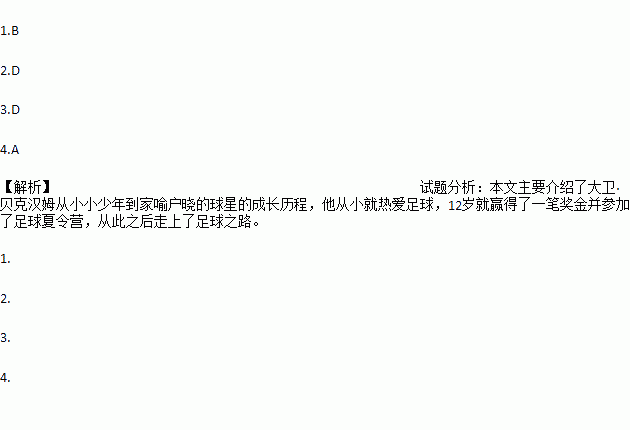题目内容
David Beckham was born in 1975 in London, at a place called Leytonstone. When he was a young boy, his greatest passion was in football. He played it whenever he had the chance. Sometimes he would go and watch a game with his friends. When David Beckham was 12 years old, he won the Bobby Charlton Soccer Skills award. This was an important step forward for this young boy, and it led him to go for a visit to a football training camp in Spain. As a boy he played for schools of Essex and also for his county team.
In 1991, he became a trainee with Manchester United. This meant that he could practice football as much as he wanted to and play for the highly successful Manchester United Youth Cup team and Under-21 team. In April, 1995 he played his first football league game against Leeds Untied. During 1995 and 1996, David became a regular member of the team and Manchester United won in both football seasons, with David scoring many goals.
His goals made him a household name. In the first game of the 1996-1997 season, he scored a surprising goal from beyond the halfway line; seeing the goalkeeper a little way out of his goal, Beckham became famous overnight. He continued to score astonishing goals, especially from free-kicks. The speed of one of his shots was timed at 157 kph. He also had the ability to make the ball go from left to right, or right to left, whenever he chose. Goalkeepers were never sure where the ball was going, and it regularly ended up in the goal.
1.Which word can take the place of the underlined word “passion” in Paragraph 1?
A. success B. interest
C. prize D. skill
2.The unusually surprising way that he scored goals .
A. helped him to gain many prizes for Essex
B. kept him playing for Leeds United
C. offered him the chance to join the national team
D. made him popular and famous
3.Which of the following shows the right order of what Beckham experienced?
a. Beckham played his first football league game
b. Beckham won the Bobby Charlton Soccer Skills award
c. Beckham played for Manchester United Youth Cup team
d. Beckham went to Spain to join a football training camp
e. Beckham played for the schools of Essex
A. e, d, a, c, b B. b, e, d, a, c
C. e, b, a, d, c D. b, d, e, c, a
4.The passage mainly talks about .
A. how Beckham became a successful football player
B. what abilities Beckham had to score so many goals
C. when Beckham became famous all over Britain
D. why Beckham could win in football league games
 轻松暑假总复习系列答案
轻松暑假总复习系列答案
